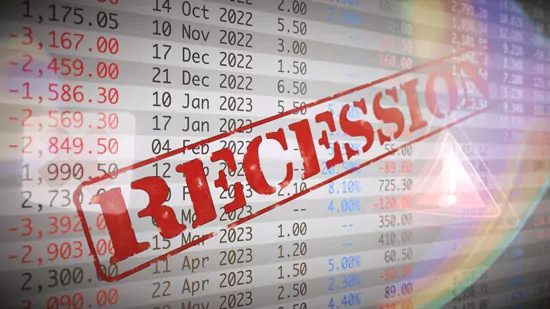Learning Center
We keep you up-to-date on the latest tax changes and news in the industry.
How to Manage Your Money During a Recession

According to one recent study, the probability of the United States experiencing a recession in the next year hit 96% in October 2022. If you needed a single statistic to outline the importance of paying attention to what is going on with the economy on a regular basis, let it be that one.
A recession can impact many things, including your job, your business, and your ability to generate a stable income. But at the same time, it also demands the question - what do you do about the money you already have? How do you best manage your money during a recession to make sure that you come out unscathed - or at least, in as solid of a position as possible - on the other side? The answers to these questions are complicated, but they are within reach - they simply require you to keep a few key things in mind along the way.

Managing Your Money in a Recession: Breaking Things Down
Experts agree that by far, one of the most important steps that you can take to manage your money during a recession is to save up an emergency fund as soon as you're capable of doing so.
If there was any major lesson taught to us by the COVID-19 pandemic, it's that one. In January 2020, few people could have predicted how drastically things would have changed just a few short months later. Suddenly, businesses found themselves closed without knowing when - or if - they'd be able to re-open again. Workers found themselves working from home, some without the capability to reasonably do so. Things changed seemingly overnight - proving that even when things seem like they're on solid footing, you truly never know what is right around the corner.
If you're in a position where if you lose your job or if your income is cut in some way, you won't be able to cover your upcoming expenses like rent, a mortgage, or utilities, you need to start working to save up an emergency fund now. It may not last indefinitely, but at the very least it can buy you enough time to figure out exactly what you need to do next.
Another viable way to manage your money during a recession is to not just invest in things that can be reasonably expected to increase in value over time but to diversify your investments over time. This is truly one of those situations where the old saying "don't put all your eggs in one basket" applies.

Don't try to choose between the stock market or something like real estate assets. If you're in a position to do so, choose both. Not only will both go up in value, but you'll also be able to significantly increase your long-term wealth over time. Even when it comes to something like the stock market, don't necessarily try to predict any individual winners. With something like an index fund, you're reaping the benefits of the strength of the entire market - not just one particular company.
Finally, always try to leverage tax advantages whenever possible. When considering the various forms of retirement accounts out there, for example, favor things like a 401k or a 457. Here, any amount of money that you put in gets deducted from your income, which impacts how much you pay in taxes for the short term. When speaking about something like a Roth IRA, any money that you put in is allowed to grow naturally and is totally tax-free until the day comes when you finally retire. Never underestimate the impact that steps like these can make on your long-term income, whether or not a recession is happening at the time.

In the end, even during periods with a particularly strong economy, it's crucial to acknowledge that a recession could still be right around the corner. As is true with most things, this is all cyclical - meaning that there will naturally be ups and downs that we all experience along the way. That's why, if you're worried about how you are going to effectively manage your money over the short term in a recession, it's always important to enlist the help of a trained professional to do precisely that. They can eliminate a lot of the stress from the situation, offering insight and expertise that allow you to focus on more important matters.
If you'd like to find out more information about how to manage your money during a recession, or if you just have any additional questions that you'd like to go over with someone in a bit more detail, please don't delay - contact us today.
Want our best tax and accounting tips and insights delivered to your inbox?
Sign up for our newsletter.
Benefits of having a business advisor
Your CFO, Reimagined as a Financial Doctor
Diagnosing root causes, prescribing solutions, and guiding your property business toward long-term wealth.
Our CFO | Advisor
Raquel is a passionate business owner. Now, she is returning to her grassroots with a twist - guiding clients with her expertise as a CPA, she can advise your company as your trusted CFO and Advisor.
-

Raquel Deodanes, MS, CPA
Co-Founder✅ CPA with Real-World Experience – I help property managers stay profitable, tax-efficient, and cash flow positive.
✅ Tax Strategist – Former advisor at California’s revenue agency.
✅ Trusted by 4,000+ Businesses – Experience across CA, FL, TX, NV, and beyond.
✅ Real Estate Investor – I understand the financial realities of property management.
✅ Entrepreneur – I’ve built businesses and know the challenges you face.
Frequently Asked Questions
-
We diagnose financial inefficiencies, treat problems like poor cash flow or rising costs, and guide you to long-term financial health. That includes cleaning up your books, forecasting cash flow, optimizing operations, and helping you grow your portfolio with confidence — just like a doctor builds a custom care plan for a patient.
-
Bookkeepers record transactions. CPAs file your taxes. We connect the dots — helping you understand your numbers, strategically improve them, and make smarter decisions throughout the year. We work alongside your existing team to drive performance, not just compliance.
-
If you're unsure where your cash is going, struggling with rising costs, planning to scale, or just tired of reacting instead of planning — now is the right time. We help you get ahead of problems, not just clean up after them.
-
Clients typically see improved cash flow, cleaner books, higher NOI, better financial reporting, and a lot less stress at tax time. More importantly, you gain clarity, confidence, and control over your business — and a partner who helps you grow it.
Pricing
Painless, transparent pricing.
Let us take away your stress and give you back your time. Choose your perfect package today.
Base
-
Dedicated finance expert
-
Bookkeeping with accrual basis
-
Includes P&L, balance sheet, and cash flow statements
Core
-
Includes everything in Base, PLUS
-
Industry KPIs and financial ratios
-
Monthly virtual 1-hr meetings
-
Monthly rolling budget forecasts
Growth
-
Includes everything in Base, CORE
-
Budget vs. actuals variance analysis and review
-
Payroll and HR Platform